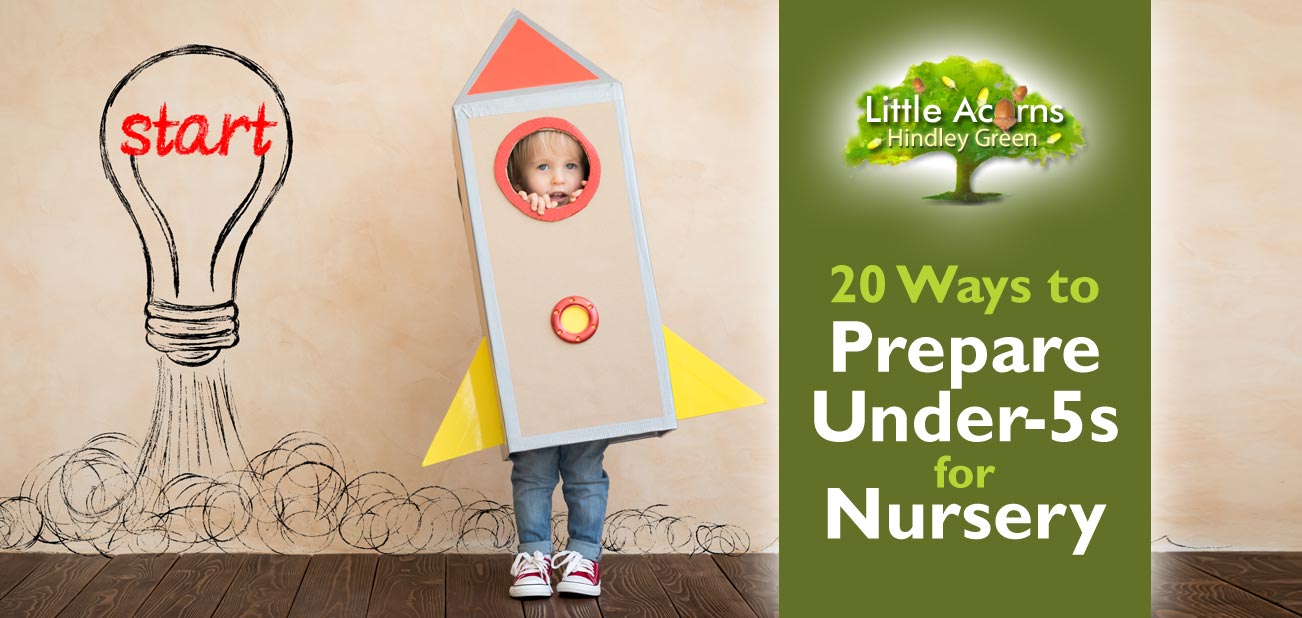
 Starting nursery or pre-school is a real milestone for children and parents alike. As well as being exciting, though, transitioning to nursery or pre-school can be daunting for the little ones. The researching of childcare settings, checking Ofsted reports and appraising recommendations from friends is all very well, but that’s only the first step. The transition will be smoother for the children themselves if a few golden rules are followed. That’s precisely where today’s guide comes in, with our 20 Ways to Prepare Under-5s for Nursery. Take a look.
Starting nursery or pre-school is a real milestone for children and parents alike. As well as being exciting, though, transitioning to nursery or pre-school can be daunting for the little ones. The researching of childcare settings, checking Ofsted reports and appraising recommendations from friends is all very well, but that’s only the first step. The transition will be smoother for the children themselves if a few golden rules are followed. That’s precisely where today’s guide comes in, with our 20 Ways to Prepare Under-5s for Nursery. Take a look.
20 Ways to Prepare Under-5s for Nursery or Pre-School.
1. Plan Well Ahead
One of the greatest tips is to plan well ahead. By planning ahead you can iron out many, if not all, of the things that may otherwise cause your child — or yourself — anxiety. Indeed, most of the tips that follow this one involve aspects of this pre-planning approach.
2. Arrange a Visit
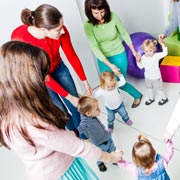 Arrange a visit of your chosen or short-listed nurseries/pre-schools. Good settings (like Little Acorns Nursery) will be happy to give you and your child a guided tour. It’s best to go during an actual session, so that you can both see the setting in action on a standard day. Bear in mind that it can also be a chance for your child to become more familiar with the setting. If they later go on to start at the nursery, they will then already be aware of what the rooms look like, where the toilets are, who their carers are, and so on. Show them the play areas inside and out and let them see the other children having fun.
Arrange a visit of your chosen or short-listed nurseries/pre-schools. Good settings (like Little Acorns Nursery) will be happy to give you and your child a guided tour. It’s best to go during an actual session, so that you can both see the setting in action on a standard day. Bear in mind that it can also be a chance for your child to become more familiar with the setting. If they later go on to start at the nursery, they will then already be aware of what the rooms look like, where the toilets are, who their carers are, and so on. Show them the play areas inside and out and let them see the other children having fun.
3. Stay for Lunch
When you visit, find out — and show your child — where they will eat lunch. Some nurseries allow prospective new children to stay over lunchtime and have lunch with their future classmates. It will be a good introduction to other children but also, for the parent, it is handy to know what sort of items other parents include in their children’s packed lunch or snack box. Or, if all meals and snacks are provided by the setting (they are at Little Acorns), ask for the weekly menu so you can explain to your child about the different types of meals they may receive.
4. Preparations Around Food & Eating
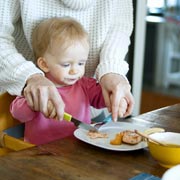 There are several things you can also do around preparing your child for eating at nursery/pre-school. For starters, get your little one used to eating in a group of other children — perhaps with friends or related children at first. Also practise cutlery skills with your child, so they’re more able to eat independently when they start.
There are several things you can also do around preparing your child for eating at nursery/pre-school. For starters, get your little one used to eating in a group of other children — perhaps with friends or related children at first. Also practise cutlery skills with your child, so they’re more able to eat independently when they start.
If your child is having a packed lunch, they can give lots of valuable input into this and will then be more ‘at home’ with the foods on the actual day — because they partly chose it.
If the nursery supplies all meals, they may be able to provide you with either the menu plan or typical sample menus. Maybe practise some of the meals at home and then your child will be more familiar with the foods.
Make sure you have told the nursery setting about any food allergies or special dietary requirements that your child may have. That’s incredibly important.
Find out the setting’s policy for refrigerated food should you have to supply an item yourself, that needs refrigeration. That’s particularly important if supplying your own food/snacks/drink for children that require a special diet.
5. Settling In Sessions
Taking all of the above a stage further, some settings allow prospective new children to come for settling-in sessions, perhaps long before they officially start at the setting. They’ll get to know the staff, facilities and other children even better this way. They’ll also become accustomed to daily life at the setting and what to expect once they start.
6. Make Some Early Friends & Encourage Socialisation
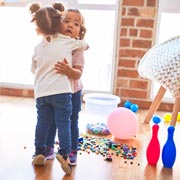 Pre-joining visits and settling-in sessions are a great way for children to make friends at the setting, but parents can also orchestrate this outside of the nursery or pre-school. For example, by finding out which friends and neighbours send their children to the setting, they can then suggest some play dates with those children. Little ones will then see one or more friendly little faces welcoming them, right from the outset, once they start at the setting. It’s a good opportunity for children to learn the art of socialising. It’s also good for parents to network in this way, so they can compare notes and perhaps pool information they might otherwise have missed.
Pre-joining visits and settling-in sessions are a great way for children to make friends at the setting, but parents can also orchestrate this outside of the nursery or pre-school. For example, by finding out which friends and neighbours send their children to the setting, they can then suggest some play dates with those children. Little ones will then see one or more friendly little faces welcoming them, right from the outset, once they start at the setting. It’s a good opportunity for children to learn the art of socialising. It’s also good for parents to network in this way, so they can compare notes and perhaps pool information they might otherwise have missed.
7. Ask Questions
Whether on visits, on the phone or via enquiry forms on nursery websites, it’s always a good idea for parents to ask staff questions that they may have. At Little Acorns Nursery in Hindley Green, for example, we’re always happy to answer questions, whether it’s about daily life, the curriculum, childcare funding, special diets or just about anything else. We’re here to help!
8. Talk With Your Child
Talk to your child about nursery, well ahead of them actually starting there. Discuss a visit you’ve made to the setting and ask your child if they have any questions, or concerns, and then address those. As the time to start gets closer, keep talking about nursery in the lead-up to it. This will get the little one used to the idea of being away from Mum or Dad and their home. Perhaps you have some photographs, a prospectus or even the setting’s website, which shows children at the nursery. Show your child these. Talk about what the children in the photos are doing, playing with or learning from. Make it all sound fun and exciting — because it really is!
Oh … and remember to talk with your child once they’ve started at the nursery. Ask them about their day and be sure to address any concerns they may have. Praise all their achievements too, no matter how small.
9. Toilet Training
 Whether your child is potty/toilet trained or still in nappies, teach them to help themselves in this type of area. If they are not yet toilet trained and are ready for it, begin to teach them. It’ll stand them in better stead once they start at nursery/pre-school. If they are newly toilet trained, though, reinforce that accidents do happen and that the childcare staff are used to it and will help change them if so.
Whether your child is potty/toilet trained or still in nappies, teach them to help themselves in this type of area. If they are not yet toilet trained and are ready for it, begin to teach them. It’ll stand them in better stead once they start at nursery/pre-school. If they are newly toilet trained, though, reinforce that accidents do happen and that the childcare staff are used to it and will help change them if so.
If they’re not yet ready for potty or toilet training and are still in nappies, get them to practise pulling up underwear garments, clothing etc.
10. Nurture Personal Hygiene
Ensure children know how and when to wash their hands. Explain the importance of handwashing and hygiene to them. This is important both from a social and health standpoint.
11. Nurture Independence
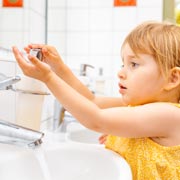 A little independence will go a long way for them once children start at nursery or pre-school. Personal hygiene and toilet training is just one of many things they can help themselves with if they’re shown how.
A little independence will go a long way for them once children start at nursery or pre-school. Personal hygiene and toilet training is just one of many things they can help themselves with if they’re shown how.
Get them used to doing the things they can do for themselves, like putting on and taking off coats and jumpers. Can your child take their socks and shoes off and put them back on again? This is handy for soft play or for spillages when socks or shoes are wet.
12. Prepare Clothing
Nearer the start date, plan outfits with your child, particularly for their first day and week. Perhaps your child has a favourite t-shirt or dress and wearing those on their first day may help them to be more confident in themselves. However, it’s important for your child to feel comfortable in their outfit too, so ensure outfits suit whatever is scheduled for the day at the nursery/pre-school — there may well be a variety of different activities lined up. Older children may indeed play outdoors as well as inside, so bear that in mind. They may need coats and even Wellington boots for outdoor play or external visits. They may need aprons for messy play. All such things need to be checked with the early years provider, well ahead. Also find out your childcare provider’s policy in regard to spare clothing should it be needed. Also, don’t forget to label your child’s clothing etc. with their name.
13. Introduce Educational Activities at Home
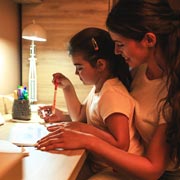 Childcare providers are more than just babysitters or a crèche. Settings like Little Acorn Nursery and many others offer a full early years education too. It’s very high quality, covering pretty much every aspect of early years learning and development and the all-important EYFS curriculum. It would be a great idea, then, for parents to get little ones used to some of the many learning, play and discovery activities associated with the EYFS while at home — before they start at their early years setting. Even just an introduction to the many different activities that they’ll encounter will help them once they start. In effect, they’ll have a little head-start and will find tasks easier. So, encourage practising at home. Introduce nursery rhymes, puzzles, building blocks, colouring and painting. Read them stories so they practise listening, concentrating and sitting still. Explain why we use an apron during messy or wet play. Introduce letter and number concepts if they’re advanced enough — and so on.
Childcare providers are more than just babysitters or a crèche. Settings like Little Acorn Nursery and many others offer a full early years education too. It’s very high quality, covering pretty much every aspect of early years learning and development and the all-important EYFS curriculum. It would be a great idea, then, for parents to get little ones used to some of the many learning, play and discovery activities associated with the EYFS while at home — before they start at their early years setting. Even just an introduction to the many different activities that they’ll encounter will help them once they start. In effect, they’ll have a little head-start and will find tasks easier. So, encourage practising at home. Introduce nursery rhymes, puzzles, building blocks, colouring and painting. Read them stories so they practise listening, concentrating and sitting still. Explain why we use an apron during messy or wet play. Introduce letter and number concepts if they’re advanced enough — and so on.
14. Embed the Routine
 In the month or weeks leading up to your child’s start date, it’s a great idea to try to mimic the timings at the nursery, so that the routine is pre-embedded. So, try to get them used to getting up and getting dressed etc. at the same time as the nursery and they can even have a restful nap at the same time as nap sessions at the setting. An appropriate bedtime routine is also important, so that your child is energised and not tired once they begin at the nursery.
In the month or weeks leading up to your child’s start date, it’s a great idea to try to mimic the timings at the nursery, so that the routine is pre-embedded. So, try to get them used to getting up and getting dressed etc. at the same time as the nursery and they can even have a restful nap at the same time as nap sessions at the setting. An appropriate bedtime routine is also important, so that your child is energised and not tired once they begin at the nursery.
15. Confirm Any Medical Issues
Have you advised the nursery about any medial issues, food allergies or disabilities that your child has? It’s important that they know.
16. Know Your Nursery Contacts
Have you the correct contact telephone numbers handy for the nursery? You need to know them (and they yours) and it’s best to add them to your mobile contacts list before your child starts. Ensure your mobile has sufficient battery each day in case you are held up or in case the nursery needs to contact you for any reason.
17. Drop-Off & Pick-Up
 Ensure that you are familiar with the pick-up and drop-off times as well as the nursery’s security arrangements should someone else be picking your child up instead of you.
Ensure that you are familiar with the pick-up and drop-off times as well as the nursery’s security arrangements should someone else be picking your child up instead of you.
18. Test the Route
Plan your journey before your child’s start date. It’s best to do this at the same time you’ll eventually be dropping off/picking up so that you know the correct timings. You don’t want to be late, especially on their first day, as that would simply cause stress for both you and your little one. Find out if there is there parking on site too.
19. Get Everything Packed The Night Before
You don’t want the first day to be stressful, so you and your child need to be ready to leave home in good time. Another way to ensure this is to pack their things the night before. As well as any spare clothing, perhaps include their favourite small cuddly toy or comforter in case they need it during their first day.
20. On the First Day, Be Calm
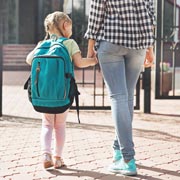 When the big day arrives for your child, don’t let on if you’re anxious or sad otherwise your child may pick up on it and become upset. So, keep it casual and don’t make a fuss when you drop them off for the first time. Staff and any friends they’ve previously made as part of your planning above are sure to welcome them. Chances are, they’ll run off into the nursery with a friend and have great fun right away anyway!
When the big day arrives for your child, don’t let on if you’re anxious or sad otherwise your child may pick up on it and become upset. So, keep it casual and don’t make a fuss when you drop them off for the first time. Staff and any friends they’ve previously made as part of your planning above are sure to welcome them. Chances are, they’ll run off into the nursery with a friend and have great fun right away anyway!
All in all, planning ahead with all these things will help to make this a fun, positive experience for both you and your little one. Chances are, your child will have an amazing first day at nursery!
A Warm Welcome at Little Acorns Nursery, Hindley Green
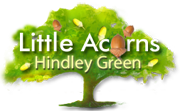
If you’re child is joining Little Acorns Nursery, our friendly, caring staff will be on hand to give your child a warm welcome and make them feel at home right away. If you have any doubts or concerns, we’re here at the end of a phone line, so you can always contact us with any queries or to check how they’re getting on. Little Acorns is a wonderful nursery & pre-school in Hindley Green and really will give your little one the very best start. We’re also located near to Wigan, Bickershaw, Leigh, Atherton, Westhoughton, Ince-in-Makerfield, Platt Bridge, Tyldesley, Bolton and Greater Manchester.
If you’re considering sending your child to Little Acorns Nursery, let us show you and your child around, so that you can see the nursery in action and witness, first hand, how happy and well cared-for children and babies are here. Please arrange a guided tour or register for a place below. We are also happy to answer any questions including those relating to the many childcare funding options that we support at the setting.
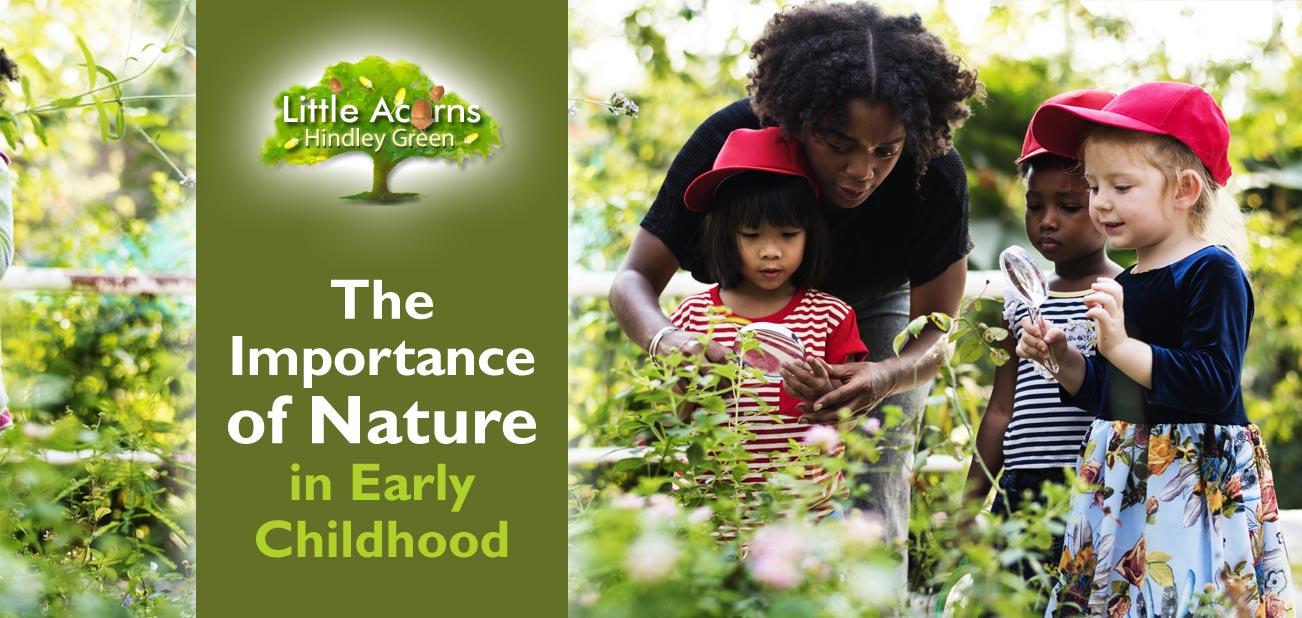
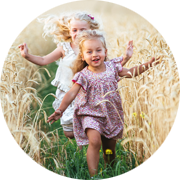 As parents, we all want the best for our children. We strive to provide them with a nurturing and stimulating environment that supports their growth and development. However, in today’s fast-paced world, it’s easy to overlook the importance of nature in our children’s lives.
As parents, we all want the best for our children. We strive to provide them with a nurturing and stimulating environment that supports their growth and development. However, in today’s fast-paced world, it’s easy to overlook the importance of nature in our children’s lives.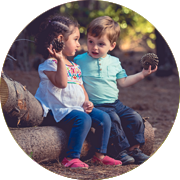 Make time for outdoor play — set aside regular time for outdoor play and exploration. This can include visits to local parks, nature reserves, or your own back garden.
Make time for outdoor play — set aside regular time for outdoor play and exploration. This can include visits to local parks, nature reserves, or your own back garden. Little Acorns provides an exceptionally high standard of weekday childcare at our Hindley Green nursery and preschool, near Wigan. We support all Government childcare funding schemes, including free hours for eligible families. Do get in touch if you would like to register your child for a place, get a guided tour with your little one or if you have any questions.
Little Acorns provides an exceptionally high standard of weekday childcare at our Hindley Green nursery and preschool, near Wigan. We support all Government childcare funding schemes, including free hours for eligible families. Do get in touch if you would like to register your child for a place, get a guided tour with your little one or if you have any questions.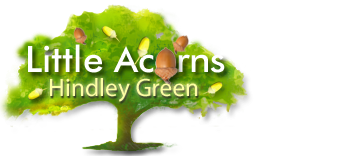

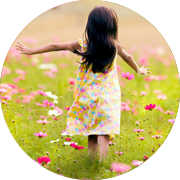
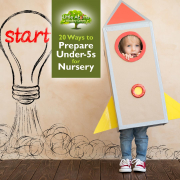

 Starting nursery or pre-school is a real milestone for children and parents alike. As well as being exciting, though, transitioning to nursery or pre-school can be daunting for the little ones. The researching of childcare settings, checking Ofsted reports and appraising recommendations from friends is all very well, but that’s only the first step. The transition will be smoother for the children themselves if a few golden rules are followed. That’s precisely where today’s guide comes in, with our 20 Ways to Prepare Under-5s for Nursery. Take a look.
Starting nursery or pre-school is a real milestone for children and parents alike. As well as being exciting, though, transitioning to nursery or pre-school can be daunting for the little ones. The researching of childcare settings, checking Ofsted reports and appraising recommendations from friends is all very well, but that’s only the first step. The transition will be smoother for the children themselves if a few golden rules are followed. That’s precisely where today’s guide comes in, with our 20 Ways to Prepare Under-5s for Nursery. Take a look. Arrange a visit of your chosen or short-listed nurseries/pre-schools. Good settings (like Little Acorns Nursery) will be happy to give you and your child a guided tour. It’s best to go during an actual session, so that you can both see the setting in action on a standard day. Bear in mind that it can also be a chance for your child to become more familiar with the setting. If they later go on to start at the nursery, they will then already be aware of what the rooms look like, where the toilets are, who their carers are, and so on. Show them the play areas inside and out and let them see the other children having fun.
Arrange a visit of your chosen or short-listed nurseries/pre-schools. Good settings (like Little Acorns Nursery) will be happy to give you and your child a guided tour. It’s best to go during an actual session, so that you can both see the setting in action on a standard day. Bear in mind that it can also be a chance for your child to become more familiar with the setting. If they later go on to start at the nursery, they will then already be aware of what the rooms look like, where the toilets are, who their carers are, and so on. Show them the play areas inside and out and let them see the other children having fun. There are several things you can also do around preparing your child for eating at nursery/pre-school. For starters, get your little one used to eating in a group of other children — perhaps with friends or related children at first. Also practise cutlery skills with your child, so they’re more able to eat independently when they start.
There are several things you can also do around preparing your child for eating at nursery/pre-school. For starters, get your little one used to eating in a group of other children — perhaps with friends or related children at first. Also practise cutlery skills with your child, so they’re more able to eat independently when they start. Pre-joining visits and settling-in sessions are a great way for children to make friends at the setting, but parents can also orchestrate this outside of the nursery or pre-school. For example, by finding out which friends and neighbours send their children to the setting, they can then suggest some play dates with those children. Little ones will then see one or more friendly little faces welcoming them, right from the outset, once they start at the setting. It’s a good opportunity for children to learn the art of socialising. It’s also good for parents to network in this way, so they can compare notes and perhaps pool information they might otherwise have missed.
Pre-joining visits and settling-in sessions are a great way for children to make friends at the setting, but parents can also orchestrate this outside of the nursery or pre-school. For example, by finding out which friends and neighbours send their children to the setting, they can then suggest some play dates with those children. Little ones will then see one or more friendly little faces welcoming them, right from the outset, once they start at the setting. It’s a good opportunity for children to learn the art of socialising. It’s also good for parents to network in this way, so they can compare notes and perhaps pool information they might otherwise have missed. Whether your child is potty/toilet trained or still in nappies, teach them to help themselves in this type of area. If they are not yet toilet trained and are ready for it, begin to teach them. It’ll stand them in better stead once they start at nursery/pre-school. If they are newly toilet trained, though, reinforce that accidents do happen and that the childcare staff are used to it and will help change them if so.
Whether your child is potty/toilet trained or still in nappies, teach them to help themselves in this type of area. If they are not yet toilet trained and are ready for it, begin to teach them. It’ll stand them in better stead once they start at nursery/pre-school. If they are newly toilet trained, though, reinforce that accidents do happen and that the childcare staff are used to it and will help change them if so. A little independence will go a long way for them once children start at nursery or pre-school. Personal hygiene and toilet training is just one of many things they can help themselves with if they’re shown how.
A little independence will go a long way for them once children start at nursery or pre-school. Personal hygiene and toilet training is just one of many things they can help themselves with if they’re shown how. Childcare providers are more than just babysitters or a crèche. Settings like Little Acorn Nursery and many others offer a full early years education too. It’s very high quality, covering pretty much every aspect of early years learning and development and the all-important
Childcare providers are more than just babysitters or a crèche. Settings like Little Acorn Nursery and many others offer a full early years education too. It’s very high quality, covering pretty much every aspect of early years learning and development and the all-important  In the month or weeks leading up to your child’s start date, it’s a great idea to try to mimic the timings at the nursery, so that the routine is pre-embedded. So, try to get them used to getting up and getting dressed etc. at the same time as the nursery and they can even have a restful nap at the same time as nap sessions at the setting. An appropriate bedtime routine is also important, so that your child is energised and not tired once they begin at the nursery.
In the month or weeks leading up to your child’s start date, it’s a great idea to try to mimic the timings at the nursery, so that the routine is pre-embedded. So, try to get them used to getting up and getting dressed etc. at the same time as the nursery and they can even have a restful nap at the same time as nap sessions at the setting. An appropriate bedtime routine is also important, so that your child is energised and not tired once they begin at the nursery. Ensure that you are familiar with the pick-up and drop-off times as well as the nursery’s security arrangements should someone else be picking your child up instead of you.
Ensure that you are familiar with the pick-up and drop-off times as well as the nursery’s security arrangements should someone else be picking your child up instead of you. When the big day arrives for your child, don’t let on if you’re anxious or sad otherwise your child may pick up on it and become upset. So, keep it casual and don’t make a fuss when you drop them off for the first time. Staff and any friends they’ve previously made as part of your planning above are sure to welcome them. Chances are, they’ll run off into the nursery with a friend and have great fun right away anyway!
When the big day arrives for your child, don’t let on if you’re anxious or sad otherwise your child may pick up on it and become upset. So, keep it casual and don’t make a fuss when you drop them off for the first time. Staff and any friends they’ve previously made as part of your planning above are sure to welcome them. Chances are, they’ll run off into the nursery with a friend and have great fun right away anyway!